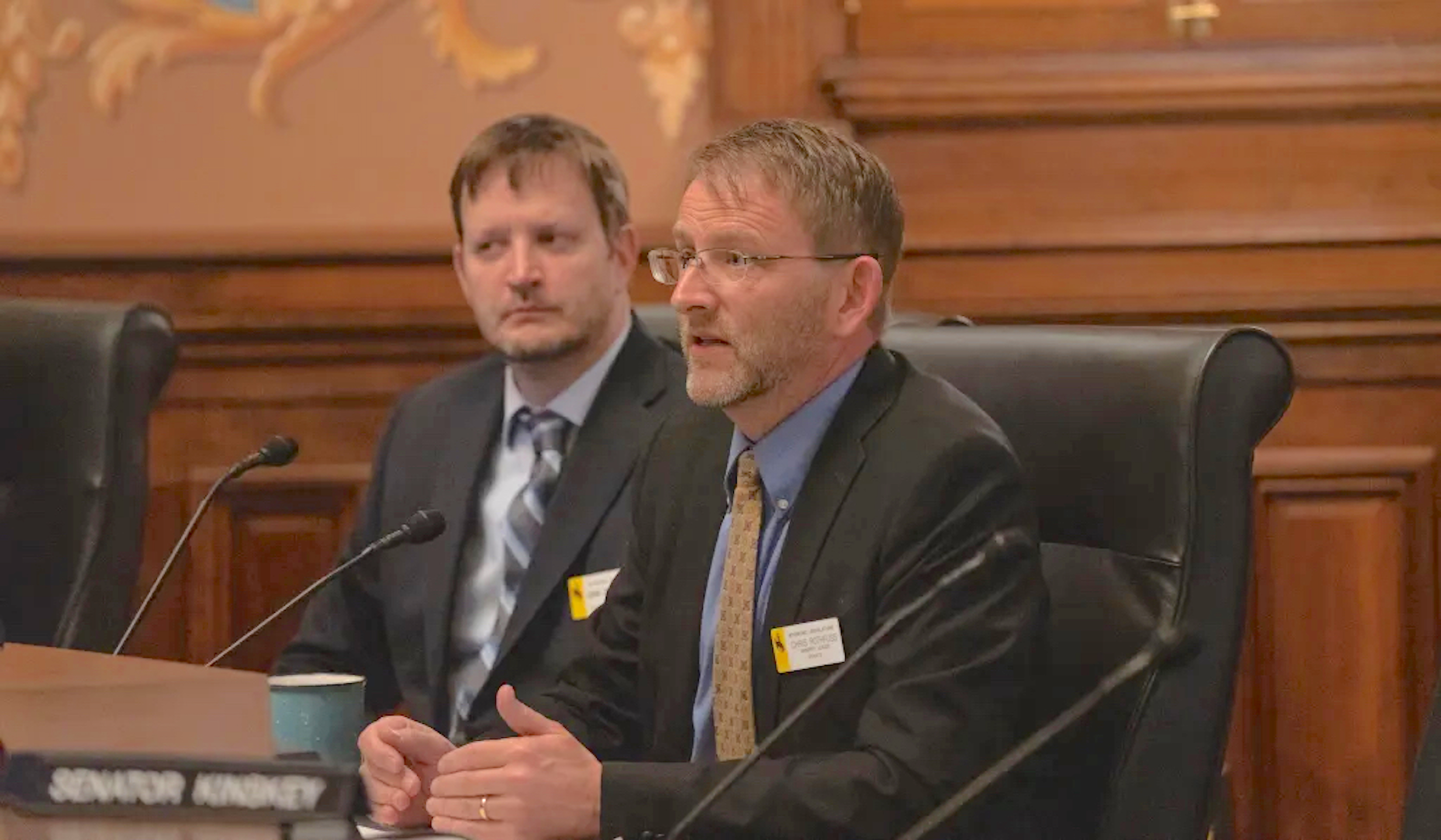Legislative panels spend months crafting bills. They’re failing more than ever.

Sen. Chris Rothfuss (D-Laramie) speaks during the 2024 budget session while Rep. Dan Zwonitzer (R-Cheyenne) listens. (Ashton J. Hacke/WyoFile)
FROM WYOFILE:
Committee-sponsored legislation is traditionally more likely to succeed at the statehouse. But this year, about a third of such bills died in an initial vote.
Wyoming lawmakers don’t spend much time at the State Capitol. Instead, they perform much of their work during the off-season known as the interim, when they meet in committees to work through topics that require more time and resources than what is available during the session.
Committee bills are the work product of those months. Shaped by public testimony and input from state agencies and other stakeholders, these bills are usually given higher regard than legislation sponsored by individual lawmakers. And given the extra time and taxpayer money that goes into developing committee bills, lawmakers traditionally prioritize them during the session and are more likely to ultimately pass them.
But by the numbers, that convention appears to be changing. During Wyoming’s 2024 budget session, committee bills failed on introduction at higher rates than ever before, according to Legislative Service Office statistics presented Monday to the Legislature’s Management Council.
Only 69% of committee bills passed introduction in the just-completed session — an all-time low since 2000 when the LSO began keeping track of the statistics. The previous low was 83% in 2008.
“Honestly, I think that’s a little bit disconcerting that that much effort went into the process. And then those bills were not given due consideration,” Sen. Chris Rothfuss (D-Laramie) told the council.
Lawmakers pointed to possible culprits.
“I think committees take on too many topics,” Speaker of the House Albert Sommers (R-Pinedale) told lawmakers during the meeting.
“And as a result, we get a mile wide and an inch deep,” Sommers said. “And I’m not sure we always bring out the best products we could because we try to do everything.”
There was also a unique set of circumstances during this year’s session.
Legislation needs two-thirds support to pass introduction during a budget session. And for the first time since the hard-line Wyoming Freedom Caucus formed in 2020, it had enough members to reject any bill upon that initial vote in the House. On day one of the session alone, 13 committee bills died at the hands of the Freedom Caucus.
That outcome was by design, Freedom Caucus Chairman Rep. John Bear (R-Gillette) told WyoFile at the time.
“The Wyoming Freedom Caucus and our allies in the House of Representatives defeated 1/3 of the policy bills that were presented for introduction yesterday,” Bear wrote in a Feb. 13 email to WyoFile. “This action was an illustration of the growing movement to both curb state government spending and bring government policy more in line with conservative values.”
Some of those bills were revived in the Senate while others passed as budget amendments, but altogether it left some lawmakers hesitant about starting the process over this interim — particularly if it’s going to be futile.
Rep. Dan Zwonitzer (R-Cheyenne) made that point Monday.
The Joint Transportation, Highways and Military Affairs Committee had asked Management Council to approve its request to study suicide prevention for both veterans and active military members.
The Joint Labor, Health and Social Services Committee, which Zwonitzer chairs, spent last interim working on “a great bill that failed introduction to try to provide mental health services for our veterans, and I couldn’t get it over the edge in the House because people thought it was Medicaid expansion.”
“Have you heard any conversation of how we should proceed?” Zwonitzer asked. “Because certainly, my side of the House said it wasn’t that important to get over the threshold this year.”
Joint Transportation Co-Chair Brian Boner (R-Douglas) noted lawmakers won’t have the two-thirds introduction rule to contend with in the 2025 general session.
Other committees have completely steered away from topics that stalled out.
The Joint Corporations, Elections and Political Subdivisions Committee, for example, did not request any election-related bills or topics for this interim after every election bill failed this session.
“To tell you the truth, Mr. Chairman, the committee has not much appetite for election bills,” Sen. Cale Case (R-Lander) told lawmakers Monday. “And I don’t really share [that with] the committee. But they are a great committee and they work hard, and they were very disappointed in the events that happened.”
Another statistic presented to lawmakers Monday indicated that lawmakers may be shifting their focus to individually sponsored bills.
“There were 610 total bill drafts requested for LSO. That is an extremely high number for a budget session,” LSO Director Matt Obrecht told lawmakers.
The number of total bill requests, in fact, hit a record high for a budget session. Committee bill requests were about average — if not on the higher end of that — leaving individually sponsored bills to account for the spike.
The Management Council concluded its work Monday evening and approved most topic requests.
WyoFile is an independent nonprofit news organization focused on Wyoming people, places and policy.
This story was posted on April 2, 2024.







